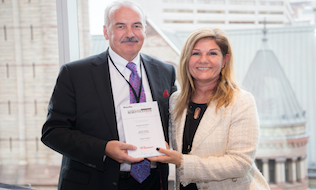

With more than 400 programs created over the past decade, Carleton University’s proactive approach to health and wellness helped it earn the inaugural Sanofi Canada Wellness Pioneer award at Benefits Canada’s 2017 Workplace Benefits Awards in Toronto on Oct. 12.
The new award recognizes an organization that has developed an innovative and effective long-term health or wellness program and can demonstrate that it has seen improved outcomes for employees. “We began our journey at Carleton 10 years ago,” said Ed Kane, assistant vice-president of university services and chair of the healthy workplace committee, as he accepted the award at the Arcadian Court. “It is a journey, it’s not a destination.”
Read: CAA honoured for wellness programs that include remote workers
The program draws from the university’s own research on wellness and recognition practices, including a benchmarking project that identified three main areas of focus: health promotion, work-life balance and mental health.
Over the past decade, Carleton has created more than 400 programs, events and workshops as part of its healthy workplace strategy. They include sports leagues that range from soccer to yoga; community experts leading workshops in crochet, meditation and calligraphy; and faculty members presenting their own research on topics like procrastination, motivation and the nature of happiness.
Alongside a robust benefits plan, the program also includes a committee made up of both senior management and employees, as well as 75 healthy workplace champions. “I’m really pleased and proud of Carleton for what we’ve done,” says Kane. “This is a great recognition of all the hard work from our senior leaders, who supported us all along the journey; to our frontline staff, who are engaged and participate in many of our activities; to our middle management, who actually helped make this all work together.”
Read: Lakeside Process Controls shows financial savings, healthier workforce in awards win
In terms of physical wellness, Carleton University provides its employees with free access to most of its athletics facilities, including the gymnasiums, 50-metre pool, fitness centre, yoga room and outdoor tennis courts. Its annual eight-week health and wellness challenge includes fitness check-ins, group activities and information sessions. Participation in the challenge has tripled since it began, with 78 employees taking part this year, up from 25 in 2012.
Its mental-health program offers training throughout the year, as well as a leadership development program called Fierce Conversations Training that focuses on improving workplace communication. To date, 265 employees have completed the program. In 2016, the university paid for three employees to receive training as mental-health first aid facilitators. Through focus groups, it heard from managers that they’re now a lot more confident working with employees with mental-health challenges or illnesses.
Read: Five tips for successful workplace mental-health training
“We’ve been doing a lot of work in the mental-health arena for our students and then we turned our focus on our faculty and staff,” says Kane. “And they have been instrumental in trying to become advocates for de-stigmatizing mental health.”
While all faculty and staff participate in the mental-health training programs, Kane considers the university’s middle managers to be the best ambassadors for providing resources and advice to other employees, as well as intervening when necessary before a problem becomes too difficult to handle. “So we’ve provided them with real boots-on-the-ground training but we’ve also trained our frontline staff in awareness of what mental health could be, what’s mentally healthy behaviour and what resources the employer can provide.”
Do you have a great story to tell about your organization’s health or pension programs? Enter the 2018 Workplace Benefits Awards. The deadline for submissions is June 30, 2018.
